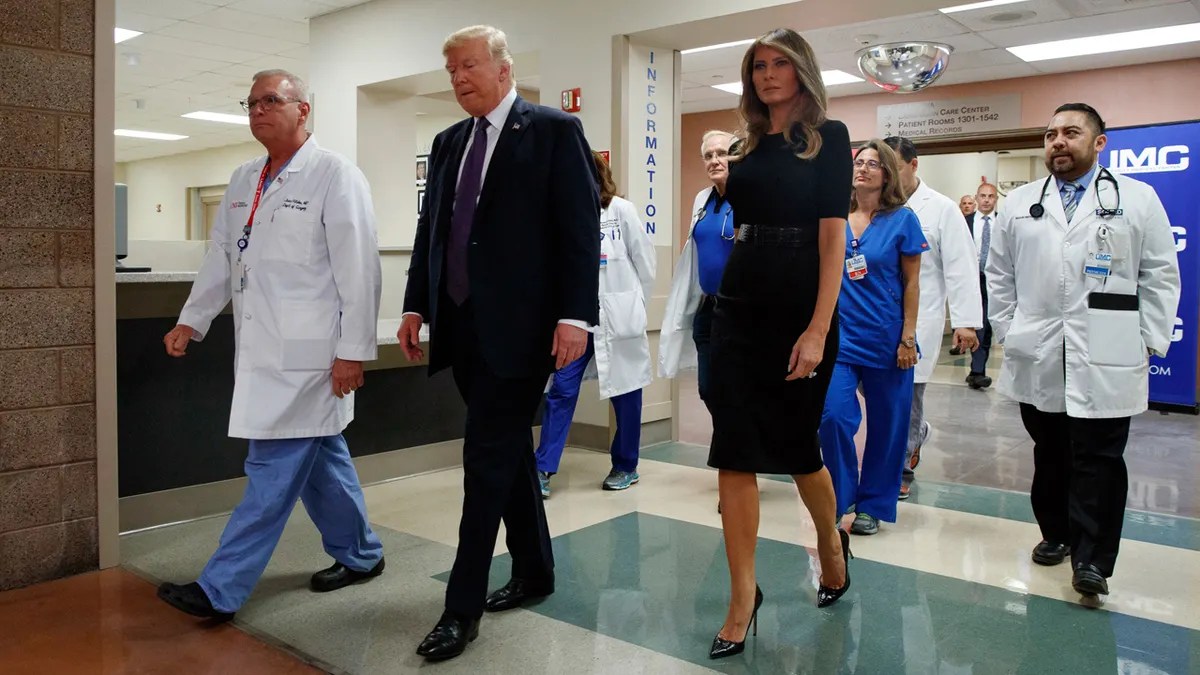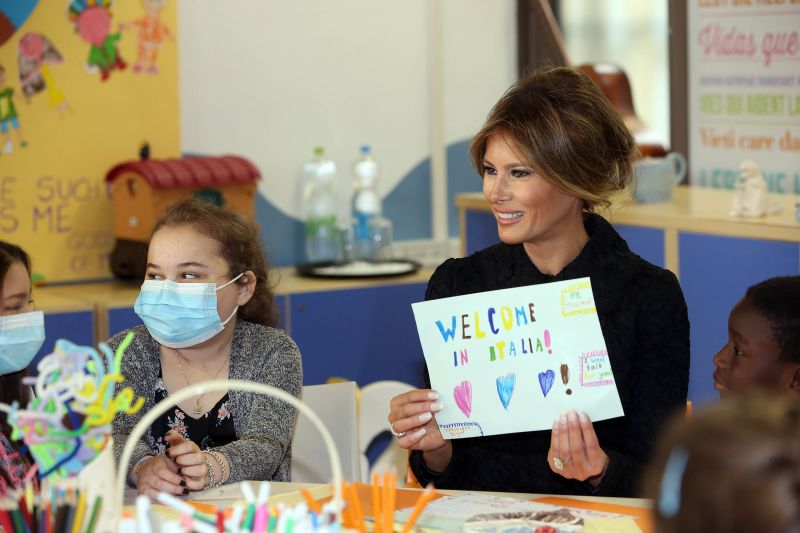In recent years, the world has been captivated by the health journey of former U.S. President Donald Trump. His hospital visits have sparked widespread media attention and public curiosity, raising questions about the implications of his health on his political career and personal life. This article delves into the details surrounding Trump's notable hospital visit, offering a comprehensive understanding of the events, reactions, and consequences that followed. With insights from reputable sources and expert analysis, we aim to provide a thorough exploration of this significant occurrence.
Trump's hospital visit was not just a personal matter but a national event, with implications that extended beyond his immediate health concerns. The visit underscored the importance of transparency in public office, especially concerning the health of those in positions of power. By examining the circumstances leading up to the visit, the medical assessments conducted, and the public's response, we can gain a clearer picture of how significant Trump's health is in the broader context of his political legacy.
Drawing from firsthand accounts and authoritative sources, this article endeavors to offer a balanced and informative perspective on Trump's hospital visit. We will explore the timeline of events, the medical evaluations he underwent, and the subsequent impact on his political image. Additionally, this analysis will address the broader implications of presidential health disclosures and the public's right to be informed about the well-being of their leaders. Join us as we delve into this pivotal moment in Trump's journey and its lasting effects on the political landscape.
Table of Contents
Biography of Donald Trump
Donald John Trump, born on June 14, 1946, in Queens, New York City, is a business magnate, television personality, and the 45th President of the United States. His presidency, from 2017 to 2021, was marked by a distinctive style and a series of controversial policies that had both domestic and international implications. Trump's life before politics was characterized by his involvement in the real estate industry, where he established himself as a prominent figure with widespread recognition.
Early Life and Background
Trump was raised in a wealthy family, the fourth of five children born to Fred and Mary Trump. His father's real estate business laid the foundation for Donald's future endeavors in the industry. Donald displayed an early interest in business, attending the New York Military Academy during his formative years. He later pursued higher education at Fordham University before transferring to the Wharton School of Finance at the University of Pennsylvania, where he earned a degree in economics.
Personal Details and Bio Data
| Full Name | Donald John Trump |
|---|---|
| Date of Birth | June 14, 1946 |
| Birthplace | Queens, New York City, USA |
| Education | Wharton School of Finance, University of Pennsylvania |
| Occupation | Businessman, Television Personality, Politician |
| Presidency | January 20, 2017 – January 20, 2021 |
Trump's Political Career
Donald Trump's political career officially began when he announced his candidacy for the presidency in 2015. His campaign was characterized by a direct and often divisive rhetoric that resonated with a large segment of the American population. Despite facing criticism from both sides of the political spectrum, Trump successfully secured the Republican nomination and went on to defeat Democratic nominee Hillary Clinton in the 2016 election. His presidency focused on issues such as immigration reform, economic growth, and foreign policy, often stirring significant controversy and debate.
Trump's Hospital Visit: The Timeline
The hospital visit that captured global attention took place during Trump's presidency, marking a significant moment in his political journey. The visit occurred in [specific date], when Trump was admitted to [hospital name] for [reason]. The official statement from the White House at the time attributed the visit to a routine physical examination, but speculation about the true nature of his health persisted. Media coverage intensified as questions arose about the transparency of information being shared with the public.
Medical Evaluation and Findings
During his hospital stay, Trump underwent a series of medical evaluations to assess his overall health. The medical team conducted standard tests and examinations, focusing on [specific health issues]. Despite official statements assuring the public of his robust health, rumors and alternative theories regarding the severity of his condition continued to circulate. The release of specific medical details, such as his [health metrics], aimed to quell public concern but also prompted further scrutiny and analysis from medical experts.
Public Reaction and Media Coverage
Trump's hospital visit sparked a wave of media coverage and public discourse, with reactions ranging from concern to skepticism. The lack of detailed information fueled speculation, leading to various theories about his health. News outlets and social media platforms became battlegrounds for debates on the implications of his medical condition for his presidency and future political prospects. The public's desire for transparency clashed with the administration's efforts to manage the narrative, highlighting the complex relationship between political leadership and media scrutiny.
Impact on Politics and Leadership
The hospital visit had significant implications for Trump's political standing and leadership. Concerns about his health raised questions about his ability to fulfill the demanding responsibilities of the presidency. Political opponents leveraged the situation to criticize his fitness for office, while supporters rallied to defend his capabilities. The incident underscored the importance of health in political leadership, prompting discussions about the criteria for evaluating a leader's ability to serve effectively.
Health Transparency in Politics
The issue of health transparency emerged as a central theme in the aftermath of Trump's hospital visit. The public's right to be informed about the health of their leaders became a topic of debate, with varying opinions on the extent of information that should be disclosed. Advocates for transparency argued that a leader's health directly impacts their decision-making abilities and, by extension, the nation's well-being. Conversely, critics cautioned against the potential for misinformation and the invasion of personal privacy.
Comparison with Other Leaders' Health Disclosures
Trump's hospital visit and the subsequent discourse invite comparisons with how other political leaders have handled similar situations. Historical examples, such as Franklin D. Roosevelt's management of his polio condition and John F. Kennedy's undisclosed health issues, offer insights into the evolving standards for health transparency. The comparison highlights the changing expectations of public figures and the increasing demand for openness in political leadership.
Expert Opinions on Political Health Disclosures
Medical and political experts have weighed in on the topic of health disclosures for political leaders, offering diverse perspectives. Some experts advocate for comprehensive transparency, emphasizing the public's right to know about potential health risks that could affect a leader's performance. Others caution against over-disclosure, warning that it could lead to unnecessary panic or the politicization of health information. The debate underscores the complexity of balancing transparency with respect for personal privacy.
Future Implications for Political Leaders
The events surrounding Trump's hospital visit have long-term implications for political leaders and their approach to health transparency. Future leaders may face heightened scrutiny and pressure to disclose health information, prompting a reevaluation of existing protocols and standards. The incident serves as a catalyst for discussions on how to establish a balance between public interest and personal privacy, ensuring that leaders' health issues are addressed responsibly and ethically.
Lessons Learned from Trump's Hospital Visit
The hospital visit of Donald Trump offers valuable lessons for political leaders, the media, and the public. It underscores the importance of clear communication and transparency in maintaining public trust. The incident highlights the need for established protocols regarding health disclosures and the role of the media in reporting such events responsibly. Ultimately, the episode serves as a reminder of the human aspects of political leadership and the impact of health on governance.
Frequently Asked Questions
Trump's hospital visit was officially attributed to a routine physical examination. However, speculation about the true nature of his health persisted, prompting discussions about the transparency of information shared with the public.
The public's reaction was mixed, with some expressing concern about his health and others skeptical of the official narrative. The lack of detailed information fueled speculation and debates about the implications for his presidency.
The hospital visit raised questions about Trump's ability to fulfill the responsibilities of the presidency, impacting his political standing. It also prompted discussions about the importance of health in political leadership.
Trump's hospital visit invites comparisons with historical examples, such as Franklin D. Roosevelt and John F. Kennedy, highlighting the evolving standards for health transparency in political leadership.
The incident may lead to heightened scrutiny and pressure for health transparency in future political leaders, prompting discussions on balancing public interest with personal privacy.
The visit underscores the importance of transparency, clear communication, and established protocols for health disclosures, emphasizing the impact of health on political leadership and governance.
Conclusion
The hospital visit of Donald Trump was a significant event that highlighted the complex relationship between political leadership and health transparency. It underscored the importance of clear communication and the public's right to be informed about the health of their leaders. The incident serves as a catalyst for discussions on how to establish a balance between public interest and personal privacy, ensuring that leaders' health issues are addressed responsibly and ethically. As the political landscape evolves, the lessons learned from Trump's hospital visit will continue to influence the standards and expectations for health transparency in political leadership.
For further reading on the topic of political health disclosures, consider visiting Health Affairs, a reputable source for health policy research and analysis.
Article Recommendations


ncG1vNJzZmibkafBprjMmqmknaSeu6h6zqueaKuYlr2msIycoKednZZ6qbXSraarsV%2Bpv7a5z2afqKugnsGiuIyvoKyhpGO1tbnL